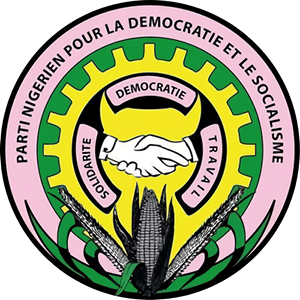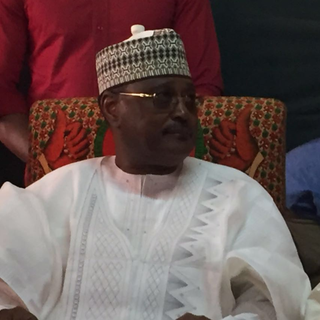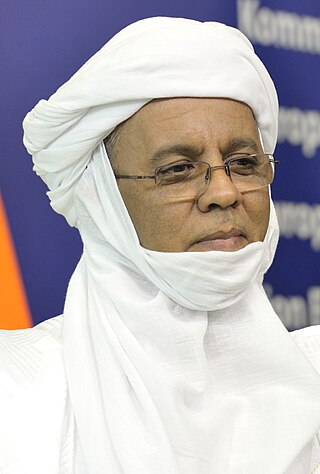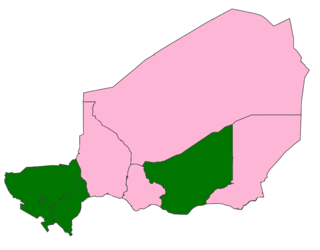Related Research Articles
This is the history of Niger. See also the history of Africa and the history of West Africa.

Politics of Niger takes place in a framework of a semi-presidential representative democratic republic,whereby the President of Niger is head of state and the Prime Minister of Niger head of government,and of a multi-party system. Executive power is exercised by the government. Legislative power is vested in both the government and the National Assembly.

Hama Amadou is a Nigerien politician who was Prime Minister of Niger from 1995 to 1996 and again from 2000 to 2007. He was also Secretary-General of the National Movement for the Development of Society (MNSD-Nassara) from 1991 to 2001 and President of the MNSD-Nassara from 2001 to 2009. Amadou is from the Kurtey,a Fula sub-group,and was raised in the Tillaberi Region,in the Niger River valley,north of Niamey.

Elections in Niger take place within the framework of a semi-presidential system. The President and National Assembly are elected by the public,with elections organised by the Independent National Electoral Commission (CENI).

Mahamadou Issoufou is a Nigerien politician who served as the President of Niger from 7 April 2011 to 2 April 2021. Issoufou was the prime minister of Niger from 1993 to 1994,president of the National Assembly from 1995 to 1996,and he was a candidate in each presidential election from 1993 to 2016. He led the Nigerien Party for Democracy and Socialism (PNDS-Tarayya),a social democratic party,from its foundation in 1990 until his election as president in 2011. During the Presidency of Mamadou Tandja (1999–2010),Issoufou was the main opposition leader.

The National Movement for the Development of Society is a political party in Niger. Founded under the military government of the 1974–1990 period,it was the ruling party of Niger from 1989 to 1993 and again from 1999 until 2010,when a coup on 18 February 2010,by a military junta called the Supreme Council for the Restoration of Democracy (CSRD) ousted the president,Mamadou Tandja.

The Nigerien Alliance for Democracy and Progress is a political party in Niger. Moumouni Adamou Djermakoye led the party from its foundation in 1992 until his death in 2009.

The Nigerien Party for Democracy and Socialism is a political party in Niger. It is a broadly left-leaning party,part of the Socialist International,and in 2011,it has been in power following the election of the former long-time leader,Mahamadou Issoufou. Mohamed Bazoum is the former President and the former Secretary-General is Foumakoye Gado.

Seyni Oumarou is a Nigerien politician who was Prime Minister of Niger from June 2007 to September 2009 and President of the National Assembly of Niger from November 2009 to February 2010. He is from the west of the country and is a member of the Djerma ethnic group. Since November 2008,he has been the President of the National Movement for the Development of Society (MNSD). He unsuccessfully stood as a presidential candidate in 2011,2016 and 2021. After years as an opposition leader under President Mahamadou Issoufou,he was appointed to the post of High Representative of the President in October 2016.

The Alliance of the Forces of Change was one of the two large political coalitions which contested for power in Niger from 1991 to 1996.

Parliamentary elections were held in Niger on 12 January 1995. The last elections of the Third Republic,they were called following a split in the ruling coalition,but resulted in a government divided between the party of the President and an opposition coalition with a majority in the National Assembly and the post of Prime Minister. The ensuing stalemate was a contributing factor to the coup that overthrew the regime on 27 January 1996.
The 1996 Nigerien coup d'état was a military coup d'état which occurred on 27 January 1996 in Niamey,Niger. It ousted Niger's first democratically elected president,Mahamane Ousmane after nearly three years in power and installed General Ibrahim BaréMaïnassara as head of state. Prime Minister Hama Amadou was arrested in the coup and several soldiers and presidential guards were killed in the fighting.

General elections were held in Niger on 12 December 1989 to elect a President and National Assembly. They were the first elections since 1970,and followed the approval of a new constitution in a referendum in September,which had made the country a one-party state with the National Movement for the Development of Society as the sole legal party. As a result,its leader,the incumbent president Ali Saibou,was elected unopposed,and the party won all 93 seats in the Assembly. Voter turnout was 95.1%.

Brigi Rafini is a Nigerien politician who served as the Prime Minister of Niger from 2011 to 2021. A native of Iférouane in Agadez Region and an ethnic Tuareg,Rafini was Minister of Agriculture in the late 1980s and Fourth Vice-President of the National Assembly of Niger from 2004 to 2009. He was appointed as Prime Minister after Mahamadou Issoufou took office as President on 7 April 2011. He is also notably the first Tuareg in office.

General elections were held in Niger on 31 January 2011 to elect the President and National Assembly,with a second round of the presidential elections on 12 March. The first round of the presidential elections was originally scheduled to be held on 3 January and the second round on 31 January,but was later postponed. The elections followed a military coup in February 2010 that ousted President Mamadou Tandja.

General elections were held in Niger on 27 December 2020 to elect the President and National Assembly. As no presidential candidate received a majority of the vote,a second round was held on 21 February 2021. Mohamed Bazoum was declared the winner in the second round with 55.67% of the vote.
Aïssata Karidjo Mounkaïla is a Nigerien former politician. She was one of the first group of women elected to the National Assembly in 1989 and remained a member until 1996. She served in the National Assembly again from 1999 to 2009.
Marie Lebihan was a Nigerien politician. She was one of the first group of women elected to the National Assembly in 1989.
Bibata Adamou Dakaou is a Nigerien former educator and politician. She was one of the first group of women elected to the National Assembly in 1989.
Roukayatou Abdou Issaka was a Nigerien politician. She was one of the first group of women elected to the National Assembly in 1989.
References
- 1 2 3 4 Mme Souna Hadizatou Diallo Première leader d’un parti politique au Niger Spécial Niger Diaspora, 16 June 2012
- 1 2 3 Alice J. Kang (2015) Bargaining for Women's Rights: Activism in an Aspiring Muslim Democracy, pp117–118